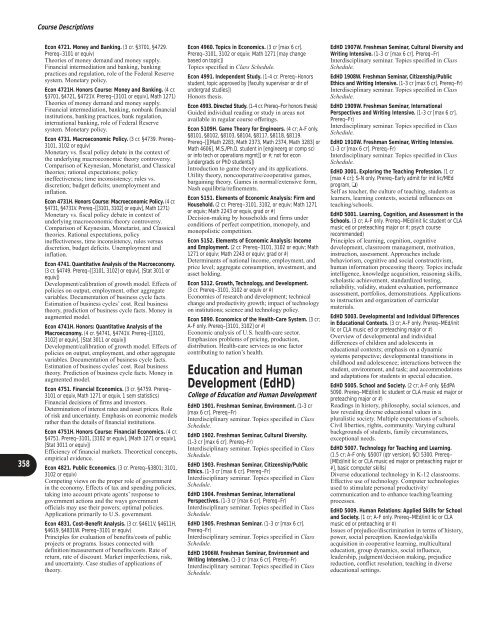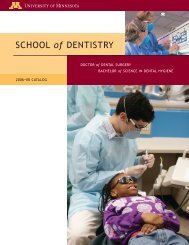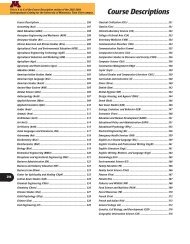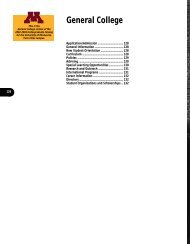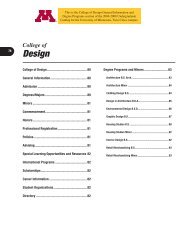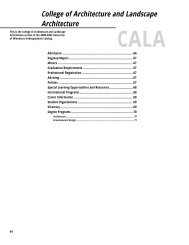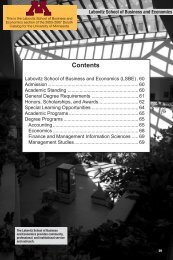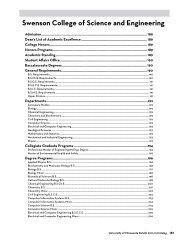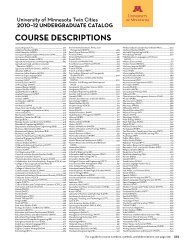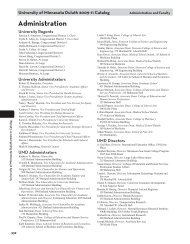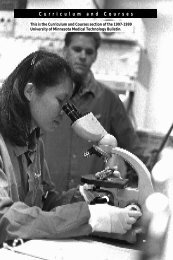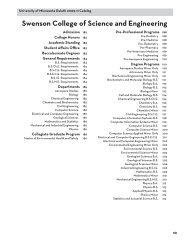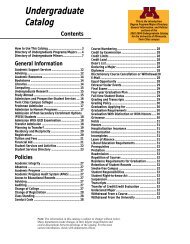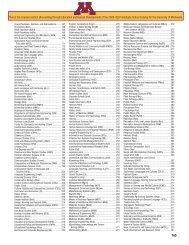Course Descriptions358Econ 4721. Money and Banking. (3 cr. §3701, §4729.Prereq–3101 or equiv)Theories <strong>of</strong> money demand and money supply.Financial intermediation and banking, bankingpractices and regulation, role <strong>of</strong> the Federal Reservesystem. Monetary policy.Econ 4721H. Honors Course: Money and Banking. (4 cr.§3701, §4721, §4721V. Prereq–[3101 or equiv], Math 1271)Theories <strong>of</strong> money demand and money supply.Financial intermediation, banking, nonbank financialinstitutions, banking practices, bank regulation,international banking, role <strong>of</strong> Federal Reservesystem. Monetary policy.Econ 4731. Macroeconomic Policy. (3 cr. §4739. Prereq–3101, 3102 or equiv)Monetary vs. fiscal policy debate in the context <strong>of</strong>the underlying macroeconomic theory controversy.Comparison <strong>of</strong> Keynesian, Monetarist, and Classicaltheories; rational expectations; policyineffectiveness; time inconsistency; rules vs.discretion; budget deficits; unemployment andinflation.Econ 4731H. Honors Course: Macroeconomic Policy. (4 cr.§4731, §4731V. Prereq–[[3101, 3102] or equiv], Math 1271)Monetary vs. fiscal policy debate in context <strong>of</strong>underlying macroeconomic theory controversy.Comparison <strong>of</strong> Keynesian, Monetarist, and Classicaltheories. Rational expectations, policyineffectiveness, time inconsistency, rules versusdiscretion, budget deficits. Unemployment andinflation.Econ 4741. Quantitative Analysis <strong>of</strong> the Macroeconomy.(3 cr. §4749. Prereq–[[3101, 3102] or equiv], [Stat 3011 orequiv])Development/calibration <strong>of</strong> growth model. Effects <strong>of</strong>policies on output, employment, other aggregatevariables. Documentation <strong>of</strong> business cycle facts.Estimation <strong>of</strong> business cycles’ cost. Real businesstheory, prediction <strong>of</strong> business cycle facts. Money inaugmented model.Econ 4741H. Honors: Quantitative Analysis <strong>of</strong> theMacroeconomy. (4 cr. §4741, §4741V. Prereq–[[3101,3102] or equiv], [Stat 3011 or equiv])Development/calibration <strong>of</strong> growth model. Effects <strong>of</strong>policies on output, employment, and other aggregatevariables. Documentation <strong>of</strong> business cycle facts.Estimation <strong>of</strong> business cycles’ cost. Real businesstheory. Prediction <strong>of</strong> business cycle facts. Money inaugmented model.Econ 4751. Financial Economics. (3 cr. §4759. Prereq–3101 or equiv, Math 1271 or equiv, 1 sem statistics)Financial decisions <strong>of</strong> firms and investors.Determination <strong>of</strong> interest rates and asset prices. Role<strong>of</strong> risk and uncertainty. Emphasis on economic modelsrather than the details <strong>of</strong> financial institutions.Econ 4751H. Honors Course: Financial Economics. (4 cr.§4751. Prereq–3101, [3102 or equiv], [Math 1271 or equiv],[Stat 3011 or equiv])Efficiency <strong>of</strong> financial markets. Theoretical concepts,empirical evidence.Econ 4821. Public Economics. (3 cr. Prereq–§3801; 3101,3102 or equiv)Competing views on the proper role <strong>of</strong> governmentin the economy. Effects <strong>of</strong> tax and spending policies,taking into account private agents’ response togovernment actions and the ways government<strong>of</strong>ficials may use their powers; optimal policies.Applications primarily to U.S. government.Econ 4831. Cost-Benefit Analysis. (3 cr. §4611V, §4611H,§4619, §4831W. Prereq–3101 or equiv)Principles for evaluation <strong>of</strong> benefits/costs <strong>of</strong> publicprojects or programs. Issues connected withdefinition/measurement <strong>of</strong> benefits/costs. Rate <strong>of</strong>return, rate <strong>of</strong> discount. Market imperfections, risk,and uncertainty. Case studies <strong>of</strong> applications <strong>of</strong>theory.Econ 4960. Topics in Economics. (3 cr [max 6 cr].Prereq–3101, 3102 or equiv; Math 1271 [may changebased on topic])Topics specified in Class Schedule.Econ 4991. Independent Study. (1-4 cr. Prereq–Honorsstudent, topic approved by [faculty supervisor or dir <strong>of</strong>undergrad studies])Honors thesis.Econ 4993. Directed Study. (1-4 cr. Prereq–For honors thesis)Guided individual reading or study in areas notavailable in regular course <strong>of</strong>ferings.Econ 5109H. Game Theory for Engineers. (4 cr; A-F only.§8101, §8102, §8103, §8104, §8117, §8118, §8119.Prereq–[[[Math 2283, Math 2373, Math 2374, Math 3283] orMath 4606], M.S./Ph.D. student in [engineerg or comp scior info tech or operations mgmt]] or #; not for econ[undergrads or PhD students])Introduction to game theory and its applications.Utility theory, noncooperative/cooperative games,bargaining theory. Games in normal/extensive form,Nash equilibria/refinements.Econ 5151. Elements <strong>of</strong> Economic Analysis: Firm andHousehold. (2 cr. Prereq–3101, 3102, or equiv; Math 1271or equiv; Math 2243 or equiv, grad or #)Decision-making by households and firms underconditions <strong>of</strong> perfect competition, monopoly, andmonopolistic competition.Econ 5152. Elements <strong>of</strong> Economic Analysis: Incomeand Employment. (2 cr. Prereq–3101, 3102 or equiv; Math1271 or equiv; Math 2243 or equiv; grad or #)Determinants <strong>of</strong> national income, employment, andprice level; aggregate consumption, investment, andasset holding.Econ 5312. Growth, Technology, and Development.(3 cr. Prereq–3101, 3102 or equiv or #)Economics <strong>of</strong> research and development; technicalchange and productivity growth; impact <strong>of</strong> technologyon institutions; science and technology policy.Econ 5890. Economics <strong>of</strong> the Health-Care System. (3 cr;A-F only. Prereq–[3101, 3102] or #)Economic analysis <strong>of</strong> U.S. health-care sector.Emphasizes problems <strong>of</strong> pricing, production,distribution. Health-care services as one factorcontributing to nation’s health.Education and HumanDevelopment (EdHD)College <strong>of</strong> Education and Human DevelopmentEdHD 1901. Freshman Seminar, Environment. (1-3 cr[max 6 cr]. Prereq–Fr)Interdisciplinary seminar. Topics specified in ClassSchedule.EdHD 1902. Freshman Seminar, Cultural Diversity.(1-3 cr [max 6 cr]. Prereq–Fr)Interdisciplinary seminar. Topics specified in ClassSchedule.EdHD 1903. Freshman Seminar, Citizenship/PublicEthics. (1-3 cr [max 6 cr]. Prereq–Fr)Interdisciplinary seminar. Topics specified in ClassSchedule.EdHD 1904. Freshman Seminar, InternationalPerspectives. (1-3 cr [max 6 cr]. Prereq–Fr)Interdisciplinary seminar. Topics specified in ClassSchedule.EdHD 1905. Freshman Seminar. (1-3 cr [max 6 cr].Prereq–Fr)Interdisciplinary seminar. Topics specified in ClassSchedule.EdHD 1906W. Freshman Seminar, Environment andWriting Intensive. (1-3 cr [max 6 cr]. Prereq–Fr)Interdisciplinary seminar. Topics specified in ClassSchedule.EdHD 1907W. Freshman Seminar, Cultural Diversity andWriting Intensive. (1-3 cr [max 6 cr]. Prereq–Fr)Interdisciplinary seminar. Topics specified in ClassSchedule.EdHD 1908W. Freshman Seminar, Citizenship/PublicEthics and Writing Intensive. (1-3 cr [max 6 cr]. Prereq–Fr)Interdisciplinary seminar. Topics specified in ClassSchedule.EdHD 1909W. Freshman Seminar, InternationalPerspectives and Writing Intensive. (1-3 cr [max 6 cr].Prereq–Fr)Interdisciplinary seminar. Topics specified in ClassSchedule.EdHD 1910W. Freshman Seminar, Writing Intensive.(1-3 cr [max 6 cr]. Prereq–Fr)Interdisciplinary seminar. Topics specified in ClassSchedule.EdHD 3001. Exploring the Teaching Pr<strong>of</strong>ession. (1 cr[max 4 cr]; S-N only. Prereq–Early admit for init lic/MEdprogram, ❏)Self as teacher, the culture <strong>of</strong> teaching, students aslearners, learning contexts, societal influences onteaching/schools.EdHD 5001. Learning, Cognition, and Assessment in theSchools. (3 cr; A-F only. Prereq–MEd/init lic student or CLAmusic ed or preteaching major or #; psych courserecommended)Principles <strong>of</strong> learning, cognition, cognitivedevelopment, classroom management, motivation,instruction, assessment. Approaches includebehaviorism, cognitive and social constructivism,human information processing theory. Topics includeintelligence, knowledge acquisition, reasoning skills,scholastic achievement, standardized testing,reliability, validity, student evaluation, performanceassessment, portfolios, demonstrations. Applicationsto instruction and organization <strong>of</strong> curricularmaterials.EdHD 5003. Developmental and Individual Differencesin Educational Contexts. (3 cr; A-F only. Prereq–MEd/initlic or CLA music ed or preteaching major or #)Overview <strong>of</strong> developmental and individualdifferences <strong>of</strong> children and adolescents ineducational contexts; emphasis on a dynamicsystems perspective; developmental transitions inchildhood and adolescence; interactions between thestudent, environment, and task; and accommodationsand adaptations for students in special education.EdHD 5005. School and Society. (2 cr; A-F only. §EdPA5090. Prereq–MEd/init lic student or CLA music ed major orpreteaching major or #)Readings in history, philosophy, social sciences, andlaw revealing diverse educational values in apluralistic society. Multiple expectations <strong>of</strong> schools.Civil liberties, rights, community. Varying culturalbackgrounds <strong>of</strong> students, family circumstances,exceptional needs.EdHD 5007. Technology for Teaching and Learning.(1.5 cr; A-F only. §5007 (qtr version), §CI 5300. Prereq–[MEd/init lic or CLA music ed major or preteaching major or#], basic computer skills)Diverse educational technology in K-12 classrooms.Effective use <strong>of</strong> technology. Computer technologiesused to stimulate personal productivity/communication and to enhance teaching/learningprocesses.EdHD 5009. Human Relations: Applied Skills for Schooland Society. (1 cr; A-F only. Prereq–MEd/init lic or CLAmusic ed or preteaching or #)Issues <strong>of</strong> prejudice/discrimination in terms <strong>of</strong> history,power, social perception. Knowledge/skillsacquisition in cooperative learning, multiculturaleducation, group dynamics, social influence,leadership, judgment/decision making, prejudicereduction, conflict resolution, teaching in diverseeducational settings.
Course DescriptionsEducational Policy andAdministration (EdPA)Department <strong>of</strong> Educational Policy and AdministrationCollege <strong>of</strong> Education and Human DevelopmentEdPA 1080. Special Topics in Leadership. (1-3 cr [max6 cr]; A-F only)For topic, see Class Schedule.EdPA 1301W. Personal Leadership in the <strong>University</strong>.(3 cr. §PA 1961)Introduces leadership using a personal leadershipframework. Students examine their own views onleadership. Differences between personal/positionalleadership, characteristics <strong>of</strong> leaders within the<strong>University</strong>, importance <strong>of</strong> personal development.EdPA 3010. Special Topics for Undergraduates. (1-3 cr[max 9 cr])Inquiry into educational policy and administrationproblems and issues.EdPA 3021. Introduction to Historical Foundations <strong>of</strong>Modern Education. (3 cr)Analysis/interpretation <strong>of</strong> important elements inmodern education derived from pre-classical sources:Greeks, Romans, Middle Ages, Renaissance,Reformation, Enlightenment, Industrial Revolution.EdPA 3023. Introduction to History <strong>of</strong> WesternEducational Thought. (3 cr)Great educational classics <strong>of</strong> Western civilization:Plato, Aristotle, Quintilian, Montaigne, Milton,Locke, Rousseau, others.EdPA 3101. Understanding Southeast Asia: anIntercultural/Interdisciplinary Policy Perspective. (3 cr)Contemporary southeast Asia. Complexities/diversity <strong>of</strong>region. Interdisciplinary orientation. Humanities andsocial science material. Case studies, critical incidents.EdPA 3102. Maximizing Study Abroad Through Cultureand Language Strategies: Pre-Departure Preparation.(1 cr. Prereq–#)Preparation for overseas sojourn: understandingculture, ways cultures differ in values, seeing oneselfas a member <strong>of</strong> a culture or cultures.EdPA 3103. Maximizing Study Abroad Through Cultureand Language Strategies: In-Country Experience. (1 cr.Prereq–3102 or #)Reflect on activities/readings <strong>of</strong> study abroadexperiences overseas. E-journaling, written activities,group interaction using various formats.EdPA 3104. Maximizing Study Abroad Through Cultureand Language Strategies: Re-Entry. (1 cr. Prereq–3103 or #)Reflect upon personal study abroad experience<strong>through</strong> readings/activities to ease transition backinto the United States and to maximize learning fromstudy abroad experience.EdPA 3302W. Leadership in the Community. (3 cr; A-Fonly. Prereq–[1301W or PA 1961W], [jr or sr], undergradleadership minor)Leadership and leadership capacities frommulticultural/multidimensional perspectives.Students examine their own views on leadership.Leadership theory/practice, group dynamics/behavior, applying knowledge.EdPA 3303. Introduction to Women in Leadership. (3 cr)Sex discrimination, female career patterns, womenleaders, inclusive conceptualizations <strong>of</strong> managerial/administrative theory.EdPA 3304. Strategic Leadership for Future Societies. (3 cr)Emerging leadership implications <strong>of</strong> selected short-/long-range trends. Construction <strong>of</strong> context-relevanteffective leadership scenarios for selected institutionsin real/hypothetical societies.EdPA 3305. Learning About Leadership Through Filmand Literature. (3 cr)Readings from leadership studies, literature, andfilm. Ethical dilemmas. Different styles <strong>of</strong> leadershipand their consequences. Intersection <strong>of</strong> public/privatein exercising leadership. Competing loyalties/pressures felt by leaders/followers. Fundamentalquestions about nature/desirability <strong>of</strong> leadership.EdPA 3402. Leadership Minor Field Experience. (2 cr; A-Fonly. Prereq–[3302W or PA 3961W] with grade <strong>of</strong> at least C, #)Students integrate lessons learned from coreleadership courses, choose from a variety <strong>of</strong> settings(e.g., community organizations, corporations,<strong>University</strong> student organizations, education).EdPA 4303W. Leadership in the World. (3 cr; A-F only.Prereq–[3302W or PA 3961W], completed field experience,undergrad leadership minor)Leadership theory, community building, socialchange, interdisciplinary approaches to complexglobal issues. Students finalize portfolios, submitscholarly products to demonstrate understanding <strong>of</strong>personal/positional leadership in changing globalcontext. Capstone course.EdPA 5001. Formal Organizations in Education. (3 cr)Classical/current theories <strong>of</strong> organizations.Applications to education and related fields.EdPA 5021. Historical Foundations <strong>of</strong> ModernEducation. (3 cr)Analysis and interpretation <strong>of</strong> important elements inmodern education derived from pre-classical sources:Greeks, Romans, Middle Ages, Renaissance,Reformation, Enlightenment, and Industrial Revolution.EdPA 5023. History <strong>of</strong> Western Educational Thought. (3 cr)Great educational classics <strong>of</strong> Western civilization:Plato, Aristotle, Quintilian, Montaigne, Milton,Locke, Rousseau, and others.EdPA 5024. History <strong>of</strong> Ideas in American Education. (3 cr)Readings in American cultural development relatedto education, including: Franklin, Jefferson, Mann,B.T. Washington, W.E.B. DuBois, Dewey. Specialreference to the emerging system <strong>of</strong> public educationin changing contexts, agrarian to urban-industrial,moderate pluralism to intense diversity.EdPA 5028. Education Imagery in Europe and America.(3 cr)Images and ideas <strong>of</strong> education expressed in thevisual arts <strong>of</strong> Western civilization (antiquity to 20thcentury) in relation to concurrent educational thoughtand practice; symbolism, myth, propaganda,didacticism, genre, caricature.EdPA 5032. Comparative Philosophies <strong>of</strong> Education. (3 cr)Exploration <strong>of</strong> the principal philosophies ineducational thought today, e.g., realism, idealism,pragmatism, and postmodernism. Practice inphilosophical critique.EdPA 5036. Ethics, Morality, and Values in Education.(3 cr)Application to key issues <strong>of</strong> pr<strong>of</strong>essional practice.Moral education, virtues, principles.EdPA 5041. Sociology <strong>of</strong> Education. (3 cr)Structures and processes within educationalinstitutions; linkages between educationalorganizations and their social contexts, particularlyrelated to educational change.EdPA 5044. Introduction to the Economics <strong>of</strong>Education. (3 cr)Costs and economic benefits <strong>of</strong> education, with afocus on K-12; educational markets, prices, andproduction relationships; investment and cost-benefitanalysis.EdPA 5048. Cross-Cultural Perspectives on Leadership.(2 cr)Introduction to cultural variables <strong>of</strong> leadership thatinfluence functioning <strong>of</strong> cross-cultural groups.Lectures, case studies, discussion, problem-solving,simulations. Intensive workshop.EdPA 5052. Ethnic Groups and Communities: Families,Children, and Youth. (3 cr)Roles <strong>of</strong> young people in widely varied NorthAmerican communities. Comparative aspects <strong>of</strong>youth commitment to society, economic value <strong>of</strong>youth, youth-adult conflict, youth roles in family.Well-defined analyses <strong>of</strong> contextual roles.Complexity <strong>of</strong> policy for appropriate educational/community development.EdPA 5056. Case Studies for Policy Research. (3 cr; A-F only)Qualitative case study research methods and theirapplications to educational policy and practice.Emphasis on designing studies that employ openendedinterviewing as primary data collectiontechnique.EdPA 5061. Ethnographic Research Methods. (3 cr)Practice in aspects <strong>of</strong> field methodology below thelevel <strong>of</strong> full field study; detailed reading; analysis <strong>of</strong>studies in anthropology and education formethodological content.EdPA 5064. Divergent Perspectives in EducationalPolicy and Practice. (3 cr)Examines fundamental and current issues in the field<strong>of</strong> education. Participants learn how to approach anissue from multiple perspectives, develop skills toidentify and analyze its component parts, andexamine personal belief systems to place a givenissue within a personal context.EdPA 5070. Special Topics: School Leadership. (1-5 cr[max 15 cr]. Prereq–BA or BS or other baccalaureate degree)Skills/knowledge necessary to respond to multiplechallenges <strong>of</strong> reduced budgets, increasedaccountability requirements, and growing concernsabout impact <strong>of</strong> technology investments in education.EdPA 5080. Special Topics: Educational Policy andAdministration. (1-3 cr [max 24 cr])Topical issues in educational policy/administration.EdPA 5087. Seminar: Educational Policy andAdministration. (1-3 cr [max 24 cr])Shared responsibility <strong>of</strong> students/instructor inpresentation <strong>of</strong> topics.EdPA 5095. Problems: Educational Policy andAdministration. (1-3 cr [max 24 cr])Course or independent study on specific topic withindepartment program emphasis.EdPA 5096. Internship: Educational Policy andAdministration. (1-9 cr [max 24 cr])Internship in elementary, secondary, general, orpostsecondary administration, or other approved fieldrelated setting.EdPA 5101. International Education and Development.(3 cr)Introduction to comparative and internationaldevelopment education, contemporary theoriesregarding the role <strong>of</strong> education in the economic,political, and sociocultural development <strong>of</strong> nations;examination <strong>of</strong> central topics and critical issues inthe field.EdPA 5102. Knowledge Formats and Applications:International Development Education Contexts. (3 cr)Analyzes the interrelationships <strong>of</strong> “knowledgecapital” (noetic symbolic resources) and culture<strong>through</strong> intrinsic, cross-, and multiculturalperspectives. Distinguishes knowledge frominformation and data, focusing on national andinternational developments occurring along basic andapplied knowledge paths.EdPA 5103. Comparative Education. (3 cr)Examination <strong>of</strong> systems and philosophies <strong>of</strong>education globally with emphasis upon African,Asian, European, and North American nations.Foundations <strong>of</strong> comparative study with selected casestudies.EdPA 5104. Strategies for International Development <strong>of</strong>Education Systems. (3 cr; A-F only. Prereq–Grad student)Strategies for improving quality/efficiency <strong>of</strong>schooling in developing countries. Introduction tocurrent research on what policy/programmaticinterventions have proven most successful inincreasing access, raising quality, and improvingefficiency <strong>of</strong> education in developing countries.EdPA 5121. Educational Reform in InternationalContext. (3 cr)Critical policy analysis <strong>of</strong> educational innovation andreform in selected countries. Use theoreticalperspectives and a variety <strong>of</strong> policy analysisapproaches to examine actual educational reformsand their implementation.Course Descriptions359For definitions <strong>of</strong> course numbers, symbols, and abbreviations, see page 300.


